154 scholarly books by Diaphanes and 6
start with E
154 scholarly books by Diaphanes and 6
154 scholarly books by Diaphanes
6 start with E start with E
6 start with E start with E
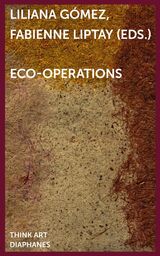
eco-operations
Edited by Fabienne Liptay and Liliana Gómez
Diaphanes, 2024
An edited collection of contributions to conversations about the climate crisis and its role in critical discourse.
The climate change crisis has become part of aesthetic discourse and critical research in culture and the arts. Future-oriented, ecologically conceived possibilities for action are being explored by artists, curators, and scholars alike. eco-operations addresses these emerging aesthetic ecologies and new technologies of cooperation that both challenge and shape a sustainable future, foregrounding interruptions, ruptures, disconnections, dissonances, exclusions, and allochronism. Moving beyond the concepts of “flow” and “network” as a single, coherent (ecological or technological) system, eco-operations instead emphasizes the frictions within asynchronously running systems. The infrastructures and formats of artistic production and exhibition play a central role here, as they themselves constitute ecosystems that invite and regulate processes of sharing and exchange. Artists and activists are embedded in these ecosystems, in which they simultaneously intervene when searching for alternative ways of creating collaborative practice. Bringing together scholars, artists, writers, and curators, and working across a range of disciplines, eco-operations explores this field of tension between global and local ecologies and aims to speculate on where dissonances imply both creative potential and political challenges.
eco-operations features contributions by Dalida María Benfield, Ursula Biemann, Lisa Blackmore, Mateo Chacón Pino, Lucrezia Cippitelli, T. J. Demos, Sandra Frimmel, Laura Flórez, Lorena Cely, Alexandra Gelis, Liliana Gómez, Fabienne Liptay, Uriel Orlow, and Dorota Sajewska.
The climate change crisis has become part of aesthetic discourse and critical research in culture and the arts. Future-oriented, ecologically conceived possibilities for action are being explored by artists, curators, and scholars alike. eco-operations addresses these emerging aesthetic ecologies and new technologies of cooperation that both challenge and shape a sustainable future, foregrounding interruptions, ruptures, disconnections, dissonances, exclusions, and allochronism. Moving beyond the concepts of “flow” and “network” as a single, coherent (ecological or technological) system, eco-operations instead emphasizes the frictions within asynchronously running systems. The infrastructures and formats of artistic production and exhibition play a central role here, as they themselves constitute ecosystems that invite and regulate processes of sharing and exchange. Artists and activists are embedded in these ecosystems, in which they simultaneously intervene when searching for alternative ways of creating collaborative practice. Bringing together scholars, artists, writers, and curators, and working across a range of disciplines, eco-operations explores this field of tension between global and local ecologies and aims to speculate on where dissonances imply both creative potential and political challenges.
eco-operations features contributions by Dalida María Benfield, Ursula Biemann, Lisa Blackmore, Mateo Chacón Pino, Lucrezia Cippitelli, T. J. Demos, Sandra Frimmel, Laura Flórez, Lorena Cely, Alexandra Gelis, Liliana Gómez, Fabienne Liptay, Uriel Orlow, and Dorota Sajewska.
[more]
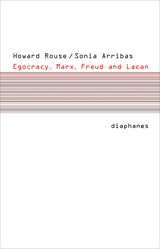
Egocracy
Marx, Freud and Lacan
Sonia Arribas and Howard Rouse
Diaphanes, 2011
This book tries to bring together the work of Marx, Freud and Lacan. It does this not by enumerating what might stereotypically be considered to be the central theses of these authors and then proceeding to combine them – a method that is inevitably doomed to failure – but instead by confronting each one of their oeuvres with what might best be described as its extimate core. The work of Marx is confronted with a problematic that implicitly, and at times even explicitly, runs throughout it: that of the splitting, dividing and doubling (or, perhaps better, knotting) of the (proletarian) subject. The work of Freud is confronted – following on from this analysis of Marx – with the hidden social and historical determination of its own most revolutionary insight, that »the nucleus of the ego is unconscious«; and this social and historical determination itself in turn allows for a reinscription of the three fundamental categories of Lacanian psychoanalysis: the symbolic, the imaginary and the real.
[more]
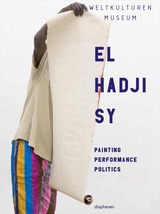
El Hadji Sy
Painting, Performance, Politics
Edited by Clémentine Deliss, Yvette Mutumba, and the Weltkulturen Museum
Diaphanes, 2015
El Hadji Sy: Painting, Performance, Politics offers the first art-historical survey on the multidimensional work of Senegalese artist, curator, and cultural activist El Hadji Sy. Spanning thirty years of his practice as a painter, performance artist, and founder of numerous artists’ collectives and workshops in Dakar (Laboratoire AGIT’ART, Tenq, and Village des Arts), it provides unprecedented insight into the conceptual and aesthetic framework of a major living artist and curator from West Africa.
With newly commissioned essays and interviews by Hans Belting, Clémentine Deliss, Mamadou Diouf, Julia Grosse, Yvette Mutumba, Philippe Pirotte, and Manon Schwich, the book is presented in a bilingual English-German edition and also contains unique archival material, including manifestos, documents, and over four hundred illustrations.
With newly commissioned essays and interviews by Hans Belting, Clémentine Deliss, Mamadou Diouf, Julia Grosse, Yvette Mutumba, Philippe Pirotte, and Manon Schwich, the book is presented in a bilingual English-German edition and also contains unique archival material, including manifestos, documents, and over four hundred illustrations.
[more]
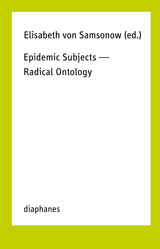
Epidemic Subjects - Radical Ontology
Edited by Elisabeth von Samsonow
Diaphanes, 2016
Modern philosophy continues to grapple with the idea of subjectivity—and, as the concept of subjectivity has consequently been repeatedly refined and redefined, the struggle has spread to the ways we conceive of sovereignty, collectivity, nationality, and identity as a result. Yet, in the absence of an authoritative account of these central philosophical concepts, exciting new ways of thinking have emerged which continue to develop and evolve.
Epidemic Subjects—Radical Ontology brings together a renowned team of contributors, including Levi Bryant, Angela Melitopoulos, and Susan Stryker, who together forge a radically inclusive definition of subjectivity. Drawing on Gilles Deleuze and Félix Guattari’s concept of the “girl” as a heuristic device for examining modern society and its foundations, they tie together recent trends in philosophy and offer a concrete way forward from the conception of the “thing” or “object” privileged by new materialism, speculative realism, and other theories of subjectivity.
Epidemic Subjects—Radical Ontology brings together a renowned team of contributors, including Levi Bryant, Angela Melitopoulos, and Susan Stryker, who together forge a radically inclusive definition of subjectivity. Drawing on Gilles Deleuze and Félix Guattari’s concept of the “girl” as a heuristic device for examining modern society and its foundations, they tie together recent trends in philosophy and offer a concrete way forward from the conception of the “thing” or “object” privileged by new materialism, speculative realism, and other theories of subjectivity.
[more]
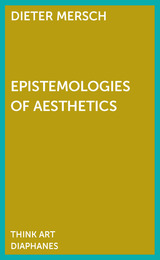
Epistemologies of Aesthetics
Dieter Mersch
Diaphanes, 2015
The ideas of “art as research” and ”research as art” have risen over the past two decades as important critical focuses for the philosophy of media, aesthetics, and art. Of particular interest is how the methodologies of art and science might be merged to create a better conceptual understanding of art-based research.
In Epistemologies of Aesthetics, Dieter Mersch deconstructs and displaces the terminology that typically accompanies the question of the relationship between art and scientific truth. Identifying artistic practices as modes of thought that do not make use of language in a way that can easily be translated into scientific discourse, Mersch advocate for an aesthetic mode of thought beyond the “linguistic turn,” a way of thinking that cannot be substituted by any other disciplinary system. A sophisticated reflection on the epistemological status of the aesthetic by one of Germany’s leading philosophers, Epistemologies of Aesthetics will be of great interest within this growing field of study.
In Epistemologies of Aesthetics, Dieter Mersch deconstructs and displaces the terminology that typically accompanies the question of the relationship between art and scientific truth. Identifying artistic practices as modes of thought that do not make use of language in a way that can easily be translated into scientific discourse, Mersch advocate for an aesthetic mode of thought beyond the “linguistic turn,” a way of thinking that cannot be substituted by any other disciplinary system. A sophisticated reflection on the epistemological status of the aesthetic by one of Germany’s leading philosophers, Epistemologies of Aesthetics will be of great interest within this growing field of study.
[more]
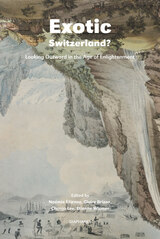
Exotic Switzerland?
Looking Outward in the Age of Enlightenment
Edited by Noémie Étienne, Claire Brizon, Chonja Lee, and Étienne Wismer
Diaphanes, 2020
During the 17th and 18th centuries, foreign material culture was introduced into France and Switzerland and integrated into European interiors and decorative arts. Scholars have emphasized this era’s emerging taste for the exotic in order to explain the unprecedented craze for lacquer, porcelain, and textiles that imitated non-Western techniques and iconography. Yet what constituted the exotic during the age of Enlightenment? How was the place of foreign material culture negotiated? And how did it impact European identities? Exotic Switzerland? moves from questions about the nature of exoticism to explore exoticism in practice. The physical relocation of material fragments in European interiors is the core of this volume. Finally, the contributors also explore the rise of disciplines such as anthropology and ethnology through collection, publication, and print culture.
[more]
READERS
Browse our collection.
PUBLISHERS
See BiblioVault's publisher services.
STUDENT SERVICES
Files for college accessibility offices.
UChicago Accessibility Resources
home | accessibility | search | about | contact us
BiblioVault ® 2001 - 2024
The University of Chicago Press









